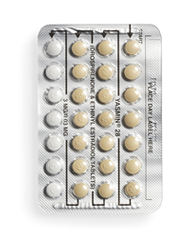Birth control pill

The birth control pill, also called “the pill” or “oral contraception” is a pill you take once a day to prevent pregnancy. There are lots of different brands of pills on the market, and new ones come out often. Most work by using hormones that keep your ovaries from releasing eggs.
There are two main categories of birth control pills, even though there are many different brands. Both types of birth control pills contain hormones. The biggest differences between them are which hormones they contain and how you use them. If you use the progestin-only pill, or mini-pill, you have to be much more careful to take your pill at the same time every day. If you are more than 3 hours late taking the mini-pill (unless you’re using the brand Slynd, which offers more flexibility), you will need to use a backup method of birth control, like condoms, for the next 48 hours. With the combination pill, you just need to make sure to take a pill a day—the timing doesn’t matter.
Types of Pills
The combination birth control pill is a type of oral contraception that contains the hormones estrogen and progestin, which work together to prevent pregnancy. The combination birth control pill is the most commonly used kind of birth control pill.
The combination pill contains two different kinds of hormones, estrogen and progestin. The main way they work to prevent pregnancy is by stopping ovulation from happening, which means that the ovaries don’t release an egg.
You take one pill a day to prevent pregnancy. Most combination birth control pills come in packs of 28 pills, with 21 consecutive pills containing hormones, followed by seven placebo pills, which don’t contain hormones. Some brands of combination birth control pills contain different numbers of pills with and without hormones. Taking the placebo pills isn’t necessary to prevent pregnancy, but it can help you make sure you start your next pack on time. And with some brands, the placebos contain vitamins like iron or folic acid. While you’re taking the placebo pills, you’re still protected from pregnancy as long as you took the pills with hormones in them correctly and start your next pack on time.
The mini-pill is an estrogen-free birth control pill. It contains a single hormone, progestin, that prevents pregnancy primarily by thickening cervical mucus, making it harder for the sperm and egg to meet. Progestin-only pills need to be taken at the same time every day to be effective at preventing pregnancy.
Most brands and generic versions of the mini-pill require a prescription, but Opill is a type of mini-pill that is available over the counter. It contains the same type of hormone and works the same way as other progestin-only pills. You can get it at drugstores, grocery stores, convenience stores, and online.
Details
Costs
If you don't have insurance or Medicaid coverage, the pill averages anywhere from $10 to $113 per month, depending whether you go generic or name brand. Tip: There are many kinds, so be sure you and your health care provider [find one that is right for you](/features/89).
####Prices: * **This method may be [free or low-cost for you](/free_birth_control)** * **With Medicaid:** Free * **With insurance:** [Free under most plans](/features/257) * **Without insurance:** The full price of the pill can range from $10 - $113 a month. Depending on your income, you may be able to go to [a low-cost clinic](/free_birth_control) to get it at reduced cost. * **Payment assistance:** For brand-name pills, contact the manufacturer’s website for information about coupons and discounts. Or contact the Partnership for Prescription Assistance at 1-888-4-PPA-NOW (1-888-477-2669) or www.pparx.org. Also, check with [your local family planning clinics](/where_to_get_it) and find out if they offer free or low-cost birth control pills (most do).How to Use It
If you can swallow an aspirin, you can take the pill. But here's the thing: You have to remember to take it every day, at roughly the same time, no matter what. (We can help with that. Just sign up for a reminder.)
Some pills come in 21-day packs. Others come in 28-day packs. Some give you a regular period every month. Others let you have your period once every three months. And some even let you skip your period for an entire year. There are so many different pills available, it can be a bit confusing. Your doctor or clinic can help you figure out which pill is right for you. #### Tips and tricks Try taking your pill at the same time you always do something else in your daily routine—like brushing your teeth. Set up a free text message or email [reminder](/reminders) with us. Have a box of [emergency contraception](/birth-control/emergency_contraception) on hand, just in case you forget your pill sometime during the month and then have sex without a condom or other barrier method.
